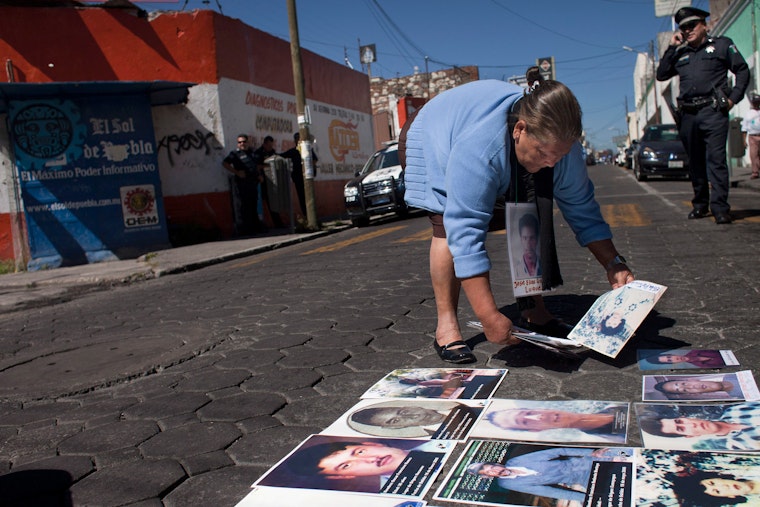Q&A: Mothers Are Leading the Search for Mexico’s Missing People

Mexico continues to break records for its rates of deadly violence and disappearances, but criminal accountability remains virtually absent. As a result, Mexico now has the highest rate of impunity of any country in the Americas. In 2018, Open Society Justice Initiative released Corruption that Kills, a report that raises questions about the growing links between public officials and organized crime in Mexico’s northern border state of Coahuila.
After finding few answers within the criminal justice system, many family members of the missing have taken up their own fight for truth and justice. Maria Eugenia Arriaga and Michael W. Chamberlin spoke with mothers from Coahuila. The mothers are affiliated with Fuerzas Unidas para Nuestros Desaparecidos en Coahuila (FUUNDEC) and Fuerzas Unidas para Nuestros Desaparecidos en Mexico (Fundem), two organizations seeking justice for the disappeared.
What do we know about the missing people in Coahuila?
Diana Iris García is the mother of Daniel Cantú Iris, who disappeared on February 21, 2007 at the age of 23: The Mexican government has said there are 40,000 missing people across the country, but we think that there are many more. In Coahuila alone, the government stated that there are 1,800 missing, but they also play with this number and it sometimes goes down when they say they have located people. The missing people in Coahuila are primarily men between 18 and 25 years old. They are our family members. They are members of our communities and we miss them.
Lourdes Herrera del Llano is the mother of Brandon Esteban Acosta Herrera, who disappeared on August 21, 2009: Many missing people in Coahuila were born in the state, and other victims were from other states across Mexico. They were in Coahuila because of their work and some were just traveling on the highways when they went missing.
How did mothers’ groups like FUUNDEC and Fundem form and start organizing?
Lourdes Herrera del Llano: In 2009, a few families were looking to organize and seek justice for their missing loved ones, despite the fear of retaliation from organized crime. At that time, we were searching for 21 missing people. On December 21, we were denied a meeting with the Coahuila’s governor, Humberto Moreira Valdés, and so we decided to go public. We held a press conference with local media and spoke about the tragic disappearances in Coahuila. Once we publicized our tragedy, many families from throughout Coahuila joined our organization. We have three boards: one seeking legislative reform, one working with humanitarian aid groups, and one focused on search and investigation. As we grew in our state, we joined forces with organizations from other states that had experienced the same tragedy. A decade later, we have formed a national movement for the thousands who are still missing.
What inspired you to join the mothers’ group?
Ixchel Teresa Mireles Rodriguez is the wife of Hector Armando Tapia Osollo, who disappeared on June 19, 2010: When I started my search, I did not know anyone who had been through the same thing. I went to the district attorney by myself to get justice, and realized that I could not fight this alone. I joined FUUNDEC, and they helped me to stay alive. A mother’s heart is a driving force, and I often tell the mothers, “Thanks to all of you that have not fallen, I cannot fall either.” These mothers have done a great deal to push for truth.
What do you want to tell the international community about what is happening in Coahuila?
Diana Iris García: We need international support because our requests and petitions have been silenced thanks to the ambitious measures taken by institutionalized crime and corrupt state actors. Despite all the investigations that we have done over the last twelve years, corruption levels are too high and we have not been able to secure justice for our loved ones.
Lourdes Herrera del Llano: We think and believe that people from outside the country should know about our reality – the government has not ever and does not now care about missing people, even when they add up to more than 35,000-40,000 in the entire country. This includes our migrant brothers and sisters. We have been denied the right to the truth, and to justice. A prevalence of impunity, indifference, and tolerance allows disappearances to go unsolved today. The government is not worried about attacking this problem and stopping it.
In 2016, the Open Society Justice Initiative joined with five leading Mexican human rights organizations to call for the creation of an internationalized mechanism to combat impunity. How could this mechanism support in your struggle for justice?
Lourdes Herrera del Llano: Not only in Coahuila, but in all of Mexico, mothers, fathers, families and all of the organizations that we work with demand and declare the urgent necessity for an international procedure to combat impunity. We need the international organizations to apply pressure and demands on the Mexican government, and ensure that they accompany us in the implementation, appraisal, and evaluation of this international mechanism against impunity.